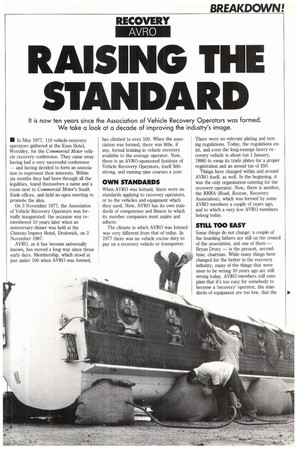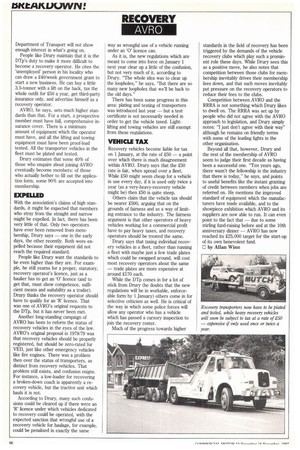RAISING THE STANDARD
Page 75

Page 76

If you've noticed an error in this article please click here to report it so we can fix it.
It is now ten years since the Association of Vehicle Recovery Operators was formed. We take a look at a decade of improving the industry's image.
• In May 1977, 110 vehicle-recovery operators gathered at the Esso Hotel, Wembley, for the Commercial Motor vehicle recovery conference. They came away having had a very successful conference — and having decided to form an association to represent their interests. Within six months they had been through all the legalities, found themselves a name and a room next to Commercial Motor's South Bank offices, and held an open meeting to promote the idea.
On 3 November 1977, the Association of Vehicle Recovery Operators was formally inaugurated: the occasion was remembered 10 years later when an anniversary dinner was held at the Chateau Impney Hotel, Droitwich, on 3 November 1987.
AVRO, as it has become universally known, has moved a long way since those early days. Membership, which stood at just under 100 when AVRO was formed, has climbed to over 520. When the association was formed, there was little, if any, formal training in vehicle recovery available to the average operator. Now, there is an AVRO-sponsored Institute of Vehicle Recovery Operators, itself 560strong, and running nine courses a year.
OWN STANDARDS
When AVRO was formed, there were no standards applying to recovery operators, or to the vehicles and equipment which they used. Now, AVRO has its own standards of competence and fitness to which its member companies must aspire and adhere.
The climate in which AVRO was formed was very different from that of today. In 1977 there was no vehicle excise duty to pay on a recovery vehicle or transporter. There were no relevant plating and testing regulations. Today, the regulations exist, and even the long-exempt heavy recovery vehicle is about (on 1 January, 1988) to swap its trade plates for a proper registration and an annual tax of 250.
Things have changed within and around AVRO itself, as well. In the beginning, it was the only organisation catering for the recovery operator. Now, there is another, the RRRA (Road, Rescue, Recovery Association), which was formed by some AVRO members a couple of years ago, and to which a very few AVRO members belong today.
STILL TOO EASY
Some things do not change: a couple of the founding fathers are still on the council of the association, and one of them — Bryan Drury — is the present, secondtime, chairman. While many things have changed for the better in the recovery industry, many of the things that were seen to be wrong 10 years ago are still wrong today. AVRO members still complain that it's too easy for somebody to become a 'recovery' operator, the standards of equipment are too low, that the Department of Transport will not show enough interest in what's going on.
People like Drury maintain that it is the Dip's duty to make it more difficult to become a recovery operator. He cites the 'unemployed' person in his locality who can draw a 240/week govermnent grant to start a new business. He can buy a little 3.5-tonner with a lift on the back, tax the whole outfit for 250 a year, get third-party insurance only, and advertise himself as a recovery operator.
AVRO, he says, sets much higher standards than that. For a start, a prospective member must have full, comprehensive insurance cover. There is a minimum amount of equipment which the operator must have, and all the lifting and towing equipment must have been proof-load tested. All the transporter vehicles in the fleet must be plated and tested.
Drury estimates that some 40% of those who enquire about joining AVRO eventually become members: of those who actually bother to fill out the application form, some 90% are accepted into membership.
EXPELLED
With the association's claims of high standards, it might be expected that members who stray from the straight and narrow might be expelled. In fact, there has been very little of that. Only two operators have ever been removed from membership, Drury says — one in the early days, the other recently. Both were expelled because their equipment did not reach the required standard.
People like Drury want the standards to be even higher than they are. For example, he still yearns for a proper, statutory, recovery operator's licence, just as a haulier has to get an '0' licence (and to get that, must show competence, sufficient means and suitability as a trader). Drury thinks the recovery operator should have to qualify for an 'R' licence. That was one of AVRO's original requests to the DTp, but it has never been met.
Another long-standing campaign of AVRO has been to reform the status of recovery vehicles in the eyes of the law. AVRO's original proposal in 1978/79 was that recovery vehicles should be properly registered, but should be zero-rated for VED, just like other emergency vehicles like fire engines. There was a problem then over the status of transporters, as distinct from recovery vehicles. That problem still exists, and confusion reigns. For instance, a low-loader for recovering a broken-down coach is apparently a recovery vehicle, but the tractive unit which hauls it is not.
According to Drury, many such confusions could be cleared up if there were an `R' licence under which vehicles dedicated to recovery could be operated, with the expected sanction that wrongful use of a recovery vehicle for haulage, for example, could be penalised in exactly the same way as wrongful use of a vehicle running under an '0' licence can.
As it is, the new regulations which are meant to come into force on January 1 next year clear up a little of the confusion, but not very much of it, according to Drury. "The whole idea was to clear up the loopholes," he says, "But there are so many new loopholes that we'll be back to the old days."
There has been some progress in this area: plating and testing of transporters was introduced last year — but a test certificate is not necessarily needed in order to get the vehicle taxed. Lightlifting and towing vehicles are still exempt from these regulations.
VEHICLE TAX
Recovery vehicles become liable for tax on 1 January, at the rate of 250 — a point over which there is much disagreement within AVRO. Drury says that the 250 rate is fair, when spread over a fleet. While £50 might seem cheap for a vehicle in use every day, if it is used only twice a year (as a very-heavy-recovery vehicle might be) then 250 is quite steep.
Others claim that the vehicle tax should be nearer 2500, arguing that on the grounds of fairness and as a way of limiting entrance to the industry. The fairness argument is that other operators of heavy vehicles working for a commercial profit have to pay heavy taxes, and recovery operators should be treated the same.
Drury says that taxing individual recovery vehicles in a fleet, rather than running a fleet with maybe just a few trade plates which could be swapped around, will cost most recovery operators about the same — trade plates are more expensive at around 2170 each.
While the DTp comes in for a lot of stick from Drury (he doubts that the new regulations will be in workable, enforceable form by 1 January) others come in for selective criticism as well. He is critical of the way in which some police forces will allow any operator who has a vehicle which has passed a cursory inspection to join the recovery roster.
Much of the progress towards higher standards in the field of recovery has been triggered by the demands of the vehicle recovery clubs which play such a prominent role these days. While Drury sees this as a positive move, he also notes that competition between those clubs for membership inevitably drives their membership fees down, and that such moves inevitably put pressure on the recovery operators to reduce their fees to the clubs.
Competition between AVRO and the RRRA is not something which Drury likes to dwell on. The RRRA was set up by people who did not agree with the AVRO approach to legislation, and Drury simply notes: "I just don't agree with their way" although he remains on friendly terms with some of the leading lights in the other organisation.
Beyond all that, however, Drury and the rest of the membership of AVRO seem to judge their first decade as having been a successful one. "Ten years ago, there wasn't the fellowship in the industry that there is today," he says, and points to useful benefits like the instant granting of credit between members when jobs are referred on. He mentions the improved standard of equipment which the manufacturers have made available, and to the showpiece exhibition which AVRO and its suppliers are now able to run. It can even point to the fact that — due to some stirling fund-raising before and at the 10th anniversary dinner — AVRO has now reached its £25,000 target for the start-up of its own benevolent fund.
o by Allan Winn




































































































































